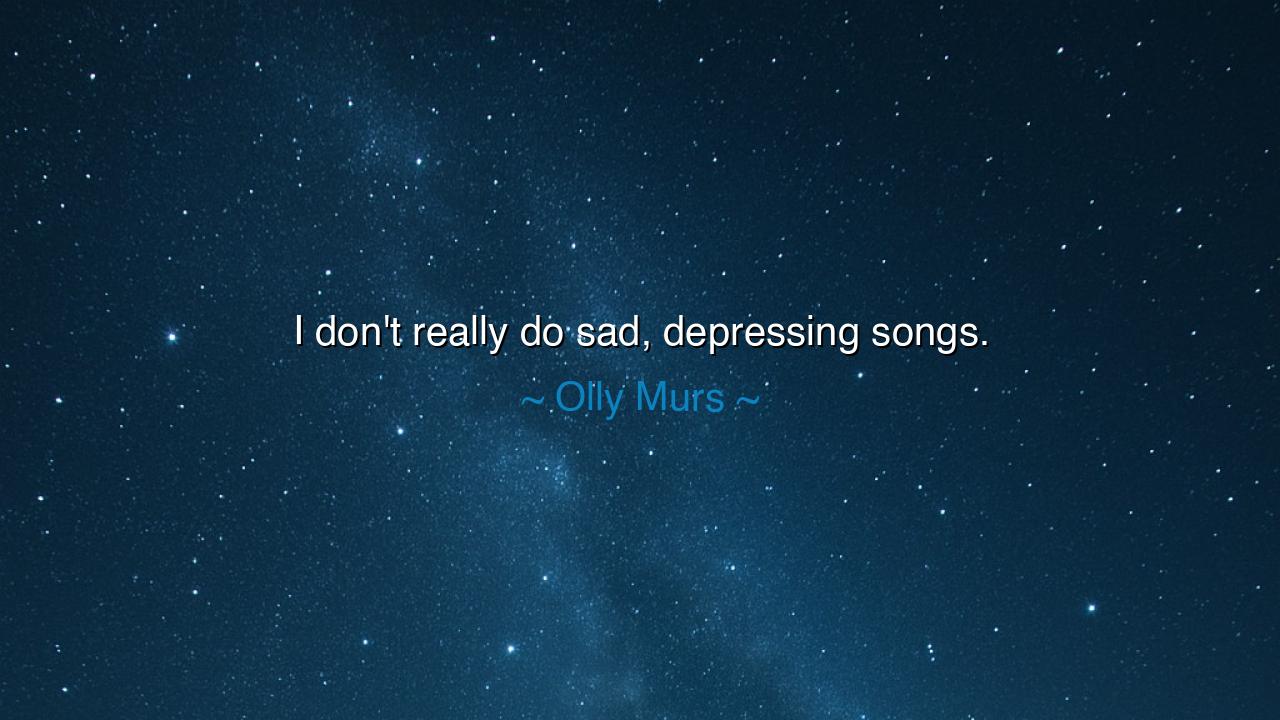
I don't really do sad, depressing songs.






“I don’t really do sad, depressing songs.” — thus spoke Olly Murs, and in his words we hear not only the voice of a singer, but a declaration of intent, a philosophy of life itself. To refuse the path of sorrow in one’s art is not to deny the existence of pain, but to choose to bring light where darkness abounds. For music, like the breath of the soul, has power not only to reflect life, but to shape it, to heal wounds, and to summon joy from despair.
The song is a vessel. It can carry lament, rage, grief, or delight. Ancient peoples knew this well. The Hebrews sang psalms of mourning in captivity, while the Greeks raised hymns of victory at festivals. To declare that one does not dwell in sad or depressing songs is to choose which current one will sail upon. Murs chooses the current of uplift, of celebration, of hope. He chooses to make his voice a lantern, rather than a lament.
Consider the tale of Beethoven’s Ninth Symphony, composed when the master was deaf and broken by life’s trials. He could have written a dirge, a requiem for his suffering. Instead, he gave the world the Ode to Joy, an anthem that rang out across centuries, declaring that even in darkness, the human spirit can rise. In his choice, we see the same wisdom: though sorrow exists, we are not bound to dwell within it. Music can be a ladder out of despair.
The origin of Murs’ words lies in his understanding of the role he plays for his listeners. In a world that already knows grief too well, he offers refuge in sound. He does not deny the sad, but he does not chain himself to it. This is a profound act of service: to create not only for the self, but for the healing of the many. His refusal to sing the depressing is not weakness, but a conscious turning toward strength.
Yet, let us not be deceived: there is courage in joy. To sing sad songs is easy when the heart is broken; to sing joyful ones requires vision, discipline, and defiance against the pull of despair. Joy, like fire, must be tended carefully, and the one who brings it forth becomes a bearer of light to all who hear. Murs thus takes upon himself the mantle of one who refuses to let his art become a mirror of misery, instead making it a wellspring of renewal.
The lesson is clear: though pain and darkness are real, we must choose what we amplify in the world. Do not deny your sorrow, but do not become its herald. Whether in music, in speech, or in daily life, ask: what energy do I bring forth? Do I add to the despair of the world, or do I bring hope, laughter, and strength? The choice belongs to each of us, and the ripple of that choice touches more lives than we imagine.
Practical action follows: when faced with hardship, resist the temptation to amplify only despair. Create something small that brings joy—write a kind word, sing a light-hearted tune, share a laugh. Fill your surroundings with what uplifts, for joy is contagious. And when you must speak of pain, let it be framed with some measure of hope, so that others may leave your presence not diminished, but strengthened.
Thus Olly Murs’ words endure not as a casual remark, but as a teaching: that art—and life itself—is a choice of tone. To say, “I don’t really do sad, depressing songs” is to declare, “I choose to be a voice of light.” May we, too, choose to let our lives sing not as dirges of despair, but as melodies of courage, joy, and hope for those who walk beside us.






AAdministratorAdministrator
Welcome, honored guests. Please leave a comment, we will respond soon